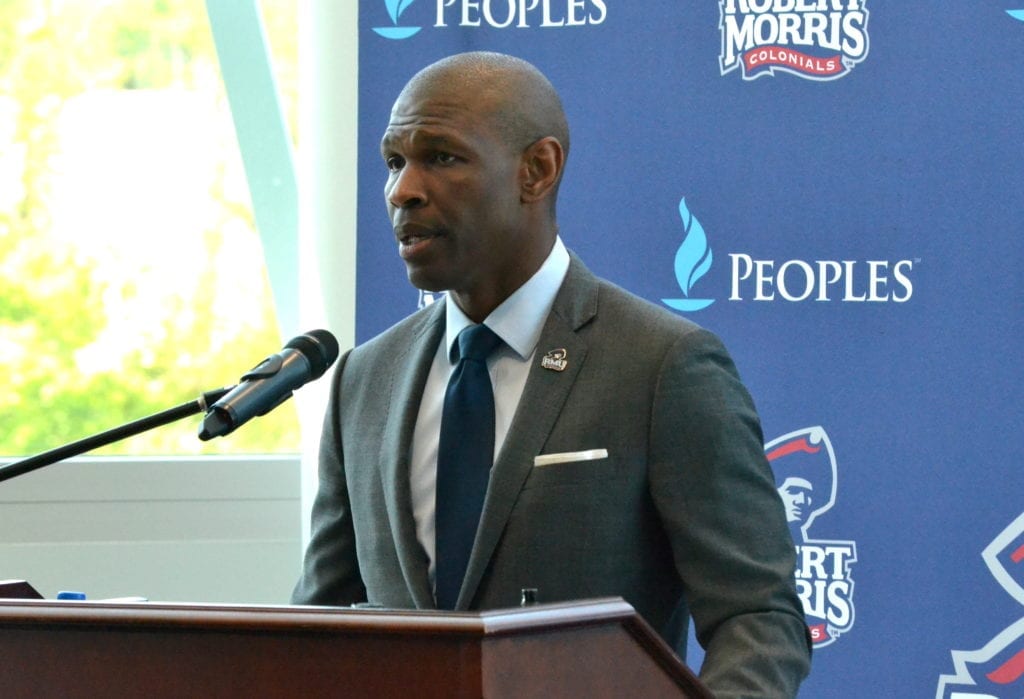Robert Morris University is in fine shape financially, president Chris Howard was sure to point out during his first press conference with local media on Tuesday since the decision was announced last week to close the school’s men’s and women’s Division I ice hockey programs.
But despite the school’s pledge of financial well-being, the continue expense of running the two Division I hockey teams was simply too much for the school of 4,000 undergrads in Moon Township to continue to bear.
“Ice hockey has been our most expensive D-I sport, in part due to the low ticket sales and limited donations, as well as having no access to things like guaranteed game opportunities, conference revenue or television contract payout,” Howard said Tuesday, six days after the initial announcement.
“Hockey’s direct expenses alone are already more than $1 million annually. That’s a margin, that’s the bottom line we end up paying out.”
Howard said that in order to sustain Robert Morris’ hockey programs, the school would need approximately $5 to $30 million in additional funding in order to make necessary improvements to the 20-year-old RMU Island Sports Center facility and fund the program long term.
“For several years, we have actively explored potential opportunities to fund improvements to our current facilities without success,” Howard said. “Like virtually all schools, our largest source of revenue at rMu is our students tuition. And we are simply unwilling to pass those costs along to our students is we emerged from a global pandemic.”
Howard said that the school does not see future cuts to athletics at this time and that athletes in other sports should not worry, while also noting that the school itself is ahead of its pace in registrations from last year.
The athletic department last cut seven sports in 2013 before re-adding men’s track and field last fall — a move that was required to keep the school from falling below the Division I minimum after men’s hockey was cut.
As a school, RMU furloughed staff and cut its overall budget by $3 million in 2020 while dealing with an estimated $10 million loss that the school attributed to the COVID-19 pandemic.
So despite the fact that the men’s and women’s hockey teams have been to three NCAA Tournaments and won four conference tournaments and five conference regular-season titles in the last nine years, it was the hockey teams and their big budget that found themselves on the chopping block.
“That success has been underwritten by the university at a cost that it is no longer sustainable to bear,” Howard said.
The press conference also included athletic director Chris King, who only briefly spoke. Howard made it clear that the decision was his to make and that he acted without a vote from the RMU board of trustees, though he said they could have chosen to override him and did not.
“I’m the president,” Howard said. “I’m the leader of the administration. … It was presented to the board of trustees. The board of trustees doesn’t sign off it. The way we’ve done it in years past is the exact same precedent. They come to a consensus, do they support it or not support it? They don’t have to do an official vote on this, and they didn’t.”
That lack of a vote caused the resignation from the board of 1979 RMU alumnus and current Pittsburgh Steelers general manager Kevin Colbert. Howard acknowledged the contentious resignation, but did not speak further on the matter.
“Kevin Colbert has served this university well,” Howard said. “We thank him for his service. But I will not speak for Kevin Colbert.”
Howard repeatedly deflected questions about the timeframe of the decision-making, saying definitively that the process of shuttering the hockey programs did not start with the sports’ exclusion from the construction of the on-campus UMPC Events Center, which was announced in 2017.
In fact, Howard cited continued discussions about the potential future of the program as a reason that the announcement was delayed two months from the end of the teams’ seasons, leaving most RMU players and coaches without a home for this coming fall.
“These decisions are never easy and the timing is never good,” Howard said, while reiterating that the players will be able to continue at RMU under full scholarship if they wish.”
Howard was also dismissive of the notion that the teams could possibly raise funds to secure their future, and ignored the suggestion that more lead time on the decision could have given the programs a chance to get out the word to potential donors.
As it stands, 55 student-athletes and seven full-time staff members will be impacted by the decision, with little hope for most of them to find a place for the 2021-22 season.






















